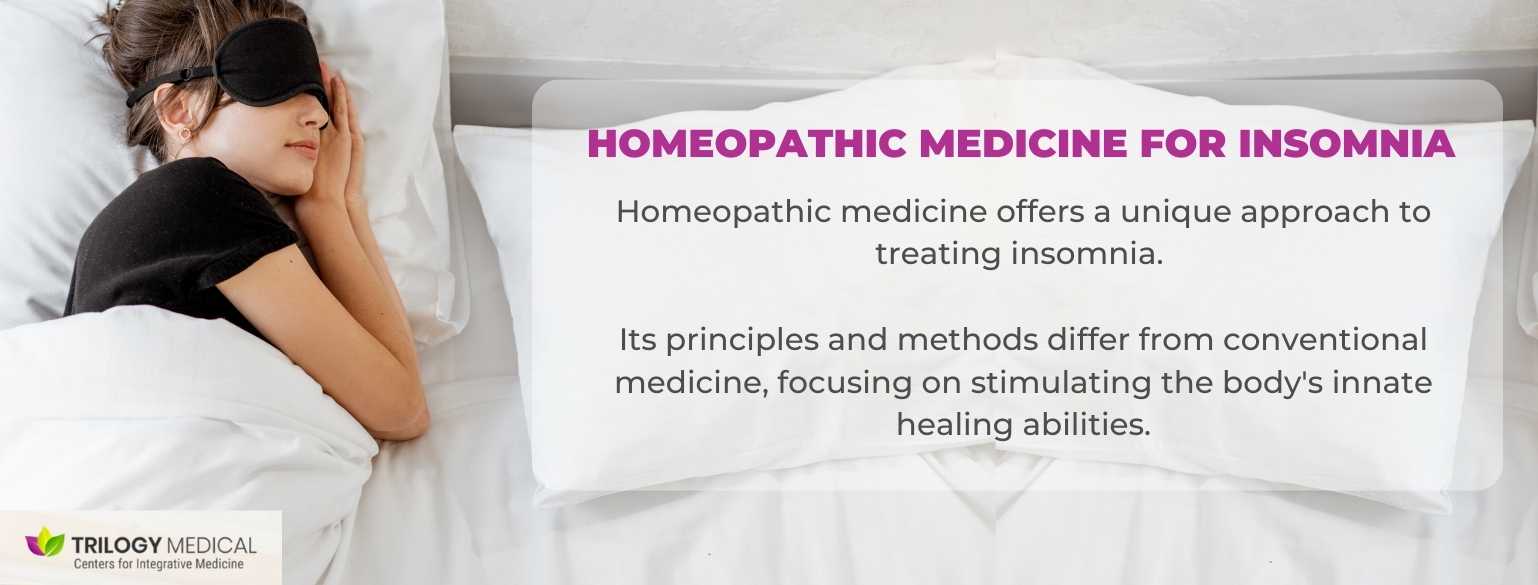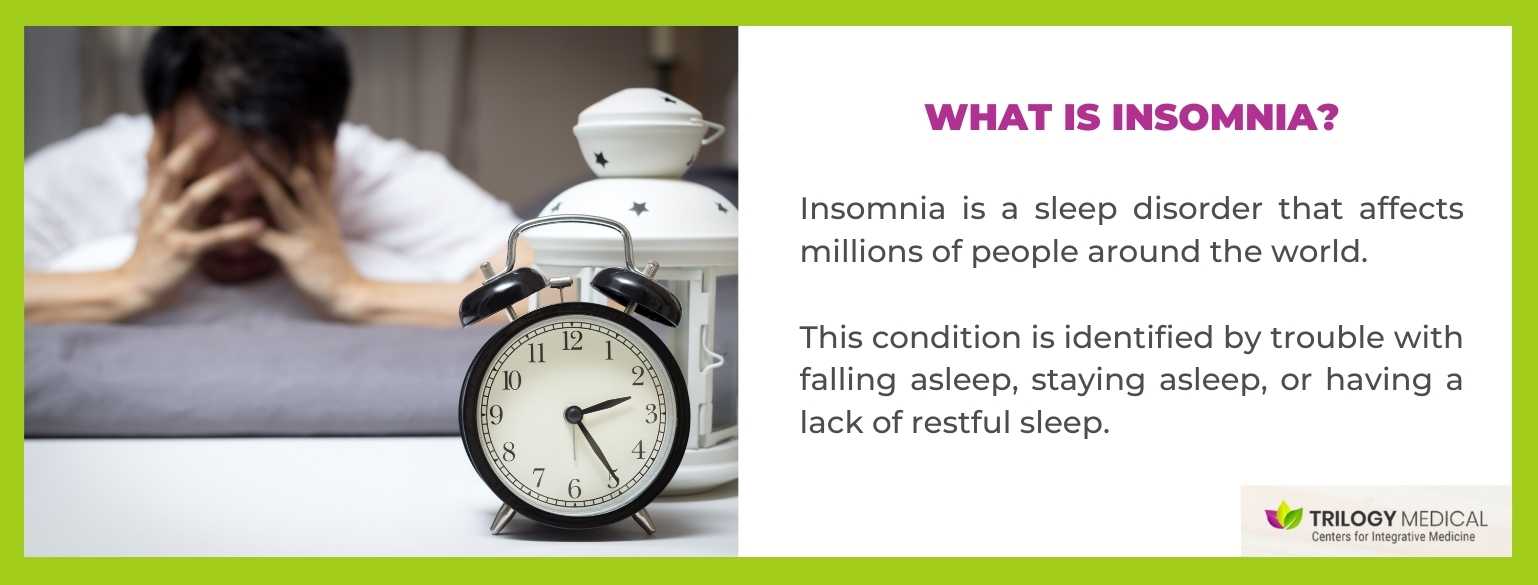Looking for a more natural and holistic approach to curing your insomnia? Look no further!
Trilogy Medical offers personalized care and effective solutions to promote natural healing to your body using homeopathic medicine for insomnia. Reclaim your health and embrace the healing power of homeopathy by scheduling an appointment with our homeopathic doctor online.
Learn more about the world of homeopathic medicine and its potential to alleviate insomnia naturally. Prepare to embark on a journey towards restful nights and rejuvenated mornings.
What is insomnia?
Insomnia is a sleep disorder that affects millions of people around the world一from teens to older adults aged 60 and above. This condition is characterized by trouble with falling asleep, staying asleep, or having a lack of restful sleep.
People with insomnia experience prolonged difficulty in initiating sleep. Individuals may lie awake in bed for an extended period, struggling to fall asleep even when feeling tired. Other common symptoms of this condition include the following:
- Frequent awakening throughout the night.
- Non-restorative sleep
- Daytime sleepiness
- Mood disturbances, such as irritability, mood swings, anxiety, and depression
Insomnia can significantly affect one’s overall well-being, impacting various physical and mental health aspects. It can impair cognitive function, weaken the immune system, and increase one’s risk of developing chronic health conditions.
Furthermore, persistent sleep difficulties and associated daytime impairments can lead to decreased enjoyment of activities, social withdrawal, and a reduced sense of well-being.
What causes insomnia?
There are a wide array of different factors that contribute to the development of insomnia. This includes the following:
Stress and anxiety
The pressures of daily life, work-related stress, relationship issues, or financial worries can all contribute to insomnia. Racing thoughts and an overactive mind make it challenging to achieve a state of relaxation necessary for sleep.
Poor sleeping habits
Irregular sleep schedules, excessive daytime napping, stimulating activities close to bedtime, and an inconsistent bedtime routine can disrupt the body's natural sleep-wake cycle, leading to insomnia.
Medical conditions
Certain medical conditions such as chronic pain, asthma, allergies, gastrointestinal problems, or hormonal imbalances can interfere with sleep and result in chronic insomnia.
Mental health disorders
Insomnia often coexists with mental health disorders like depression, anxiety, post-traumatic stress disorder (PTSD), or bipolar disorder. The relationship between these conditions is complex, as insomnia can worsen mental health symptoms and vice versa.
Medications and substances
Some medications used to treat other health conditions may disrupt sleep patterns. This includes certain antidepressants, asthma medications, or medications that affect the central nervous system.
Additionally, the use of stimulants like caffeine, nicotine, or alcohol close to bedtime can hinder sleep quality.
How does homeopathic medicine work?
Homeopathic medicine offers a unique approach to treating insomnia. Its principles and methods differ from conventional medicine, focusing on stimulating the body's innate healing abilities. Here’s how homeopathic medicine works as an alternative medicine for insomnia.
Following the principle of "Like Cures Like"
Homeopathy follows the principle of "like cures like," also known as the Law of Similars. This principle suggests that a substance capable of producing specific symptoms in a healthy person can, in a highly diluted form, stimulate the body's healing response to alleviate those same symptoms in a person suffering from those conditions.
In the case of insomnia, homeopathic remedies are chosen based on their ability to produce sleep-related symptoms in a healthy individual.
Individualization in homeopathy
Homeopathy recognizes that each person experiences insomnia differently, and a one-size-fits-all approach is ineffective. The practice of individualization involves thoroughly assessing the person's unique symptoms, sleep patterns, emotional state, and overall health.
Homeopathic remedies are then carefully selected to match the individual's specific symptoms and underlying causes of their insomnia. This personalized approach enhances the effectiveness of treatment.
That’s why at Trilogy Medical, we take the time to listen and understand your symptoms and health concerns. Through a holistic approach, we then formulate individualized treatment plans to support your body’s natural healing abilities.
Holistic healing
Homeopathy treats the whole person, taking into account the physical, mental, and emotional aspects of health. Insomnia is not viewed as an isolated symptom but as a manifestation of an imbalance within the individual.
Homeopathic medicine for insomnia aims to restore overall well-being by addressing the underlying causes of insomnia, such as stress, anxiety, or physical ailments.
Additionally, homeopathy supports better sleep quality and overall health by promoting balance and harmony in the body,
What homeopathic remedies are commonly used for insomnia?
Several homeopathic remedies or alternative medicine for insomnia are commonly used to promote better sleep. Let's explore a few of these remedies and discuss how they work to alleviate sleeplessness.
1. Coffea cruda
Coffea cruda, derived from coffee beans, is often prescribed for individuals who experience a racing mind and an inability to switch off their thoughts at night.
Despite feeling physically tired, their mind remains hyperactive, leading to sleeplessness. Coffea cruda helps calm the mind and promotes a sense of tranquility, allowing for a more peaceful sleep.
2. Nux vomica
Nux vomica一derived from the seeds of the Strychnos nux-vomica tree一is a remedy suitable for individuals who experience sleeplessness due to an overactive and stressful lifestyle. These individuals may be irritable, easily angered, and find it challenging to relax.
Nux vomica helps to soothe the nervous system, alleviate stress-related sleep disturbances, and restore a more balanced sleep pattern.
3. Passiflora incarnata
Passiflora incarnata, derived from the passionflower plant, is a well-known remedy for insomnia caused by mental overactivity, restlessness, and anxiety. It calms the nervous system, reducing racing thoughts and promoting a sense of tranquility.
Passiflora incarnata is particularly useful for those who have difficulty falling asleep due to an overactive mind.
4. Arsenicum album
Arsenicum album, prepared from arsenic trioxide, is indicated for individuals experiencing anxiety, restlessness, and a sense of unease at night. These individuals may wake up frequently during the night, feeling anxious or fearful.
Arsenicum album helps to alleviate anxiety, promote relaxation, and support more restful and uninterrupted sleep.
5. Lycopodium clavatum
Lycopodium clavatum, obtained from the spores of the clubmoss plant, is prescribed for individuals who experience insomnia with digestive disturbances. These individuals may suffer from bloating, gas, or indigestion, disrupting their ability to fall or stay asleep.
Lycopodium clavatum helps address both digestive issues and the associated sleep disturbances.
6. Ignatia amara
Another alternative medicine for insomnia is Ignatia amara, derived from the seeds of the St. Ignatius bean.
It is often recommended for patients who experience insomnia due to grief, emotional stress, or loss. Furthermore, these individuals may also have difficulty falling asleep, wake up frequently throughout the night, or have vivid dreams. Ignatia amara helps soothe emotional distress, promote relaxation, and support more restful sleep.
A homeopathic practitioner will consider an individual's specific symptoms, temperament, and overall health when prescribing a remedy. Homeopathic remedies aim to stimulate the body's innate healing mechanisms and restore balance, promoting a sense of calm, relaxation, and improved sleep quality.
It’s crucial to remember that finding the proper homeopathic remedy can take time and is best done under the guidance of a qualified practitioner. Homeopathic medicine for insomnia often requires careful individualization, as the homeopath may need to adjust the remedy based on the patient’s unique and evolving response.
Dr. Lester, with his 35 years of experience as a physician specializing in homeopathy, understands the complexities of this process. Attempting to self-prescribe for chronic conditions is not recommended, as it is unlikely to be effective and may even delay proper treatment.
In a world where sleeplessness can be all-consuming, finding a gentle and effective solution is paramount.
Trilogy Medical offers a natural and personalized approach to tackling insomnia at its core. By addressing the underlying causes and providing individualized remedies, homeopathy paves the way for restful nights and rejuvenated mornings.
Besides utilizing homeopathic medicine for insomnia, we also specialize in addressing a wide range of health conditions, such as:
Dr. Jeff Lester, our experienced homeopathic practitioner, brings his expertise and deep understanding of the principles of homeopathy to deliver individualized treatment plans tailored to your specific needs.
Contact us now to schedule your appointment with Dr. Lester. Begin your journey toward natural, holistic healing today!
The material contained on this site is for informational purposes only and DOES NOT CONSTITUTE THE PROVIDING OF MEDICAL ADVICE, and is not intended to be a substitute for independent professional medical judgment, advice, diagnosis, or treatment. Always seek the advice of your physician or other qualified healthcare providers with any questions or concerns you may have regarding your health.



